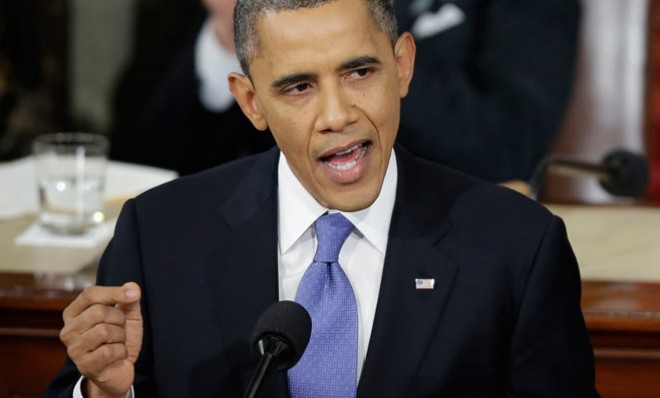The political failure of Obama's State of the Union proposals
The president's speech: High on rhetoric. Low on political reality

A free daily email with the biggest news stories of the day – and the best features from TheWeek.com
You are now subscribed
Your newsletter sign-up was successful
Shielded from the scrutiny of an absent future election, President Obama is a politician unleashed. And, as evidenced by his State of the Union address, America's chief executive is reveling in his newfound freedom.
Unfortunately, last night's forceful call to action offered little for a country desperate for serious solutions. On topics from the national debt to the war in Afghanistan, the president's speech was rich in partisanship and weak on good policy.
Let's consider the details.
The Week
Escape your echo chamber. Get the facts behind the news, plus analysis from multiple perspectives.

Sign up for The Week's Free Newsletters
From our morning news briefing to a weekly Good News Newsletter, get the best of The Week delivered directly to your inbox.
From our morning news briefing to a weekly Good News Newsletter, get the best of The Week delivered directly to your inbox.
On the economy, Obama offered a combination of new and old. First, a new minimum wage — which, although its prospective benefits are unclear — at least deserves a fair debate. But things got worst from there. Obama chose to regurgitate his dead-on-arrival American Jobs Act, which would explode the deficit. He called for higher spending on education, mortgages, infrastructure, and energy. Worthy? Perhaps. Affordable? No. America is broke. We have no money.
On the national debt, the president played his usual game: Accusing Republicans who seek meaningful entitlement reform of waging war on the poor, while simultaneously making the hard-to-believe claim that modest Medicare re-structuring will save that crucial program. This gimmickry might make for good TV and easy populism, but it insults reality. And on the sequester, new revenues must follow serious spending reforms to win bipartisan support. The president didn't offer any. Ultimately, Obama is faced with a simple choice — either engage in serious compromise, or be the commander-in-chief who allows the U.S. military to suffer disastrous cuts.
On Afghanistan, the president seemed more concerned with the politics of Washington than the realities of Afghanistan. As Michael O'Hanlon pointed out last week, after years of difficulty, the opportunity for a stable and semi-peaceful Afghan future is now on the horizon. Obama claims he wants to secure this positive future, but by ordering the withdrawal of 34,000 troops by this time next year, he has weighted our military with an extraordinary challenge. Without sufficient forces, crucial efforts to mentor, train, and support Afghan security personnel will be limited. Obama's announcement also poses a secondary problem. Intentionally or not, the president is encouraging an accelerated rush to the exits by our partners. Running for office in 2008, Obama referred to Afghanistan as "the good war" and promised that he would adequately resource U.S. operations in that country. How things have changed. Now, after thousands of lives, tens of thousands of serious injuries, and many hundreds of billions of dollars, the president is ready to snatch defeat from the jaws of victory.
On energy, Obama largely ignored the bounty of jobs and independence that America could embrace, preferring to continue with his renewable energy obsession. And while his calls for action on climate change were welcome, uniting economics, energy and the environment in beneficial common cause will require more than words. It will demand positive engagement with the coal, gas, and oil lobbies.
A free daily email with the biggest news stories of the day – and the best features from TheWeek.com
On gun control, an issue that deserves respectful dialogue, Obama was at his proselytizing worst. It's clear that we need a national discussion on reducing gun violence. But aggressive federal diktats aren't the answer. The majority of gun owners have suggested that they would be open to closing background check loopholes. Obama could have welcomed this compromise. Instead, he employed the language of an emotional bulldozer and endorsed constitutionally problematic laws.
In short, this was a speech high on rhetoric and low on political reality. In some ways, that may have been the point. Perhaps the president has decided to wait for the 2014 elections and cling to the hope (however unlikely) for a Democratic recapture of the House. Whatever his motivations, as long as the president is content to preach liberal orthodoxy to a divided nation, America's problems will multiply and our future will be less hopeful.
Tom Rogan is a conservative writer who blogs at TomRoganThinks.com. Follow him on Twitter: @TomRoganTweets.
Tom Rogan is a conservative writer who blogs at TomRoganThinks.com.
-
 What to watch out for at the Winter Olympics
What to watch out for at the Winter OlympicsThe Explainer Family dynasties, Ice agents and unlikely heroes are expected at the tournament
-
 Properties of the week: houses near spectacular coastal walks
Properties of the week: houses near spectacular coastal walksThe Week Recommends Featuring homes in Cornwall, Devon and Northumberland
-
 Will Beatrice and Eugenie be dragged into the Epstein scandal?
Will Beatrice and Eugenie be dragged into the Epstein scandal?Talking Point The latest slew of embarrassing emails from Fergie to the notorious sex offender have put her daughters in a deeply uncomfortable position
-
 The billionaires’ wealth tax: a catastrophe for California?
The billionaires’ wealth tax: a catastrophe for California?Talking Point Peter Thiel and Larry Page preparing to change state residency
-
 Bari Weiss’ ‘60 Minutes’ scandal is about more than one report
Bari Weiss’ ‘60 Minutes’ scandal is about more than one reportIN THE SPOTLIGHT By blocking an approved segment on a controversial prison holding US deportees in El Salvador, the editor-in-chief of CBS News has become the main story
-
 Has Zohran Mamdani shown the Democrats how to win again?
Has Zohran Mamdani shown the Democrats how to win again?Today’s Big Question New York City mayoral election touted as victory for left-wing populists but moderate centrist wins elsewhere present more complex path for Democratic Party
-
 Millions turn out for anti-Trump ‘No Kings’ rallies
Millions turn out for anti-Trump ‘No Kings’ ralliesSpeed Read An estimated 7 million people participated, 2 million more than at the first ‘No Kings’ protest in June
-
 Ghislaine Maxwell: angling for a Trump pardon
Ghislaine Maxwell: angling for a Trump pardonTalking Point Convicted sex trafficker's testimony could shed new light on president's links to Jeffrey Epstein
-
 The last words and final moments of 40 presidents
The last words and final moments of 40 presidentsThe Explainer Some are eloquent quotes worthy of the holders of the highest office in the nation, and others... aren't
-
 The JFK files: the truth at last?
The JFK files: the truth at last?In The Spotlight More than 64,000 previously classified documents relating the 1963 assassination of John F. Kennedy have been released by the Trump administration
-
 'Seriously, not literally': how should the world take Donald Trump?
'Seriously, not literally': how should the world take Donald Trump?Today's big question White House rhetoric and reality look likely to become increasingly blurred